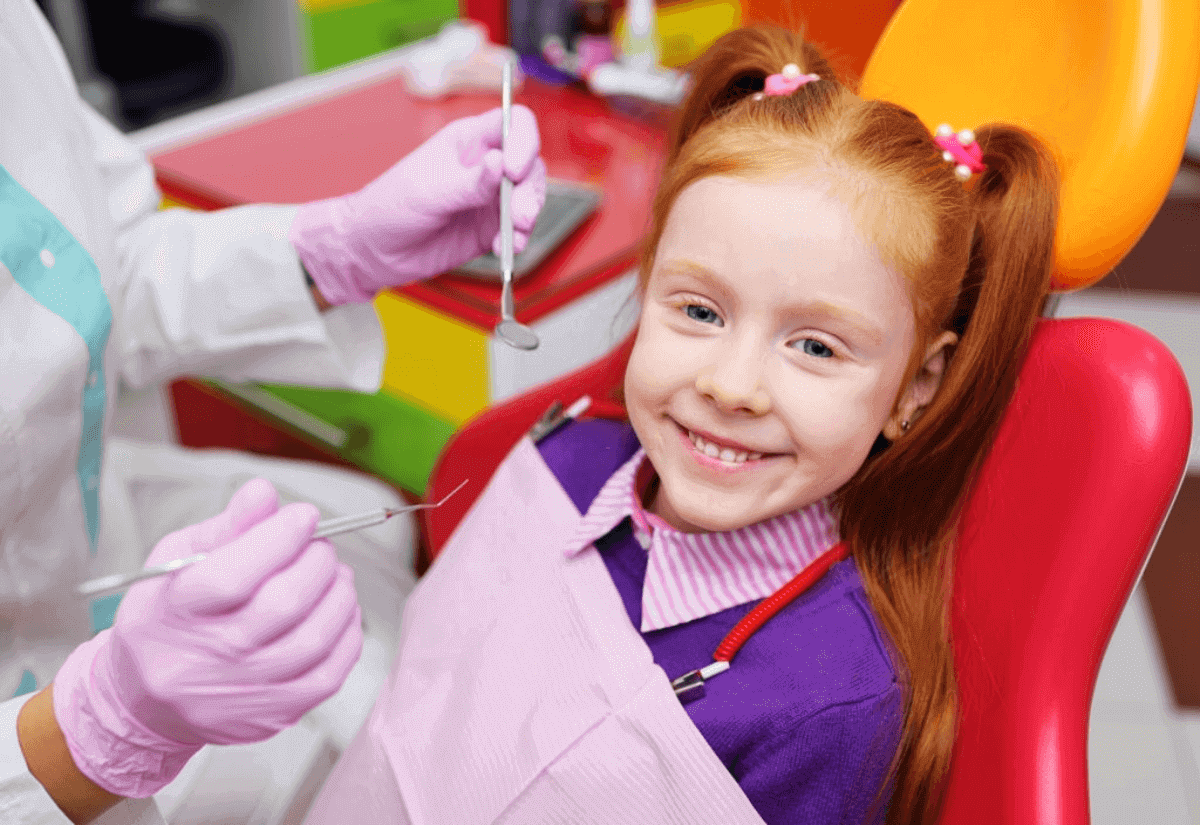Practicing healthy oral habits begins early on and for this reason, maintaining your child’s dental care is a priority. It is important to understand how to properly implement these healthy practices into your child’s daily routine. According to The American Dental Hygienists Association (ADHA), parents are recommended to clean the inside of their child’s mouth post feeding using a soft cloth or gauze pad. In addition, parents should avoid bringing bottled milk, juice or formula into their child’s bed for self-feeding as these contain sugar. Sugar feeds the harmful bacteria on your child’s teeth, creating an acid that is responsible for eroding the enamel. This causes plaque and over time it will lead to the formation of cavities.
When Should my Child Start Seeing a Dentist?
Once your child turns one, you should take your child to your pediatric dentist near you for their first dental visit. During this visit, your dentist will assess your child’s current oral health and a likelihood of your child developing future dental issues. If your dentist believes that your child is susceptible to future dental concerns, then being proactive is key. Be sure to book an appointment at a dental clinic before his or her first birthday or six months after your child’s first primary teeth appear. After this visit, make regular visits every six months. If your baby has dental problems caused by injury, poor eating habits or due to a developmental problem, be sure to see your dentist as soon as possible.
You can avoid cavities by simply practicing the following three basics of children’s dental care:
Brushing:
Brushing removes plaque and bacteria from your child’s teeth while refreshing their breath. It should be noted that when it comes to brushing, there is a specific technique that should be practiced. Brushing should be done in calm circular motions moving from tooth to tooth. The toothbrush should be placed at a forty-five-degree angle to the child’s gum line. Children should be using an age-appropriate toothbrush that is soft-bristled.
Flossing:
Your child’s adjacent teeth are in contact with each other at some point. Flossing removes food particles and bacteria in-between the teeth that brushing can leave behind. Dentists suggest the C shape flossing technique. Teach your kids to relax the floss into a C shape and gently glide the floss between the teeth. Be sure both sides of each gap are also being cleaned.
Rinsing:
The final step to your child’s dental hygiene routine is to rinse. Rinsing the mouth fights off bacteria that can ward off gum disease in the future. Children that are six years and above should use a fluoride mouth wash for this. Davie dentists recommend brands such as “Listerine Smart Rinse for Kids.”
What to Watch For
Both adults and children are susceptible to forming tooth decay. The culprit is the dreaded plaque which sticks to the teeth by bacteria, food, and acid in conjunction with one’s saliva. Bacteria produce acids that destroy tooth enamel over time, causing the formation of cavities. Sensitivity to sugary foods and cold beverages might occur when tooth decay is present. Visual indicators of early tooth decay include chalky white spots on the child’s teeth, a light brown discoloration, a small hole, or a darkening of a child’s entire tooth. If you notice any of these signs on your child’s teeth, visit a Davie dental clinic immediately. If your child does not receive proper dental care, including an examination by a Davie dentist, the tooth decay can be left undetected and worsen. As a result, pain or tooth loss may occur for your little one, always ensure you look for the signs and visit your dentist every six months.
Parents are The Best Role Models
Parents play the most important role in their child’s life and this is also the case when it comes to your child’s dental health. However, the most powerful impact on your children will come from observing your own oral hygiene habits. Demonstrate to your child how important their teeth are to them. Always reinforce hygiene habits such as brushing, flossing and make conscious decisions when it comes to food choices. Prioritizing dental health will result in a healthier child, impacting both their future habits and livelihood. In addition, your oral health and general health will improve as a parent.



